Iranian Markets Eagerly Await Positive News On Deal With US

Media in Iran speculated on Wednesday that the visit of Omani foreign minister Sayyid Badr Albusaidi a day earlier could signal a deal with the United States.

Media in Iran speculated on Wednesday that the visit of Omani foreign minister Sayyid Badr Albusaidi a day earlier could signal a deal with the United States.
Many news websites in Tehran said that Albusaidi visited Iran for a crucial diplomatic mission, as part of Oman’s traditional mediating role with the United States.
In recent months, US officials have travelled to Oman and held indirect talks with Iranian counterparts, presumably over the fate of American dual nationals held hostage in Tehran. Reports have suggested that the US is willing to allow $7 billion of Iranian funds frozen in South Korea to be released in exchange for the freedom of these prisoners.
Tejarat News, a business website in Tehran said that the currency market is awaiting positive news from the visit of the Omani top diplomat to sell off US dollars. Iran’s rial is near an all-time low against the US currency due to a very high inflation rate said to be at least 70 percent.
On Wednesday, the rial was trading slightly higher at around 486,000 to the US dollar.
Iran’s economy has been starved of most of its oil export revenues since 2018 when the United States pulled of the 2015 JCPOA nuclear deal and imposed sanctions.
The Biden administration, which disagreed with its predecessor over the decision, has unsuccessfully tried to revive the accord as Iran has violated the deal and dangerously increased uranium enrichment.
Despite the secret diplomatic contacts, the Biden administration insists there are no imminent deals with Tehran.
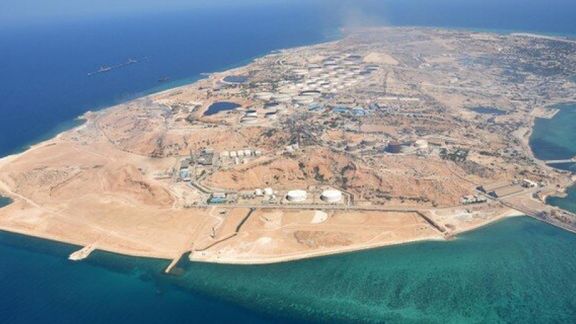
Iranian public figures are condemning local hardline media that support Russia's position questioning Iran's sovereignty over three islands in the Persian Gulf.
Russia's undermined Iran's territorial integrity by signing a joint Persian Gulf Cooperation Council (GCC) statement last week, suggesting that the ownership of the islands should be reviewed by the International Court of Justice. This action sparked a huge outcry in Iran and among diaspora Iranians, with some considering Russia's move as treason.
The Raisi administration-owned daily newspaper, Iran, on July 13 accused media outlets that condemned Russia's humiliating stance of creating unnecessary controversy. The newspaper also charged that the anti-Russian articles in the Iranian media were written under the order of the United States.
Maryam Shokrani, a journalist in Tehran who had been threatened a few months earlier by intelligence agents, expressed her views in Threads, stating, "Its name is 'Iran' newspaper, but it supports Russia. That is the same Russia that not only does not recognize Iran's ownership of the three islands, but also uses the terms 'The Gulf' and 'The Arabian Gulf' in its official accounts instead of the Persian Gulf."
The three islands were under British control but on November 30, 1971, a day after British forces left the region and just two days before the UAE was to become an official federation, Mohammad Reza Shah sent the Iranian navy to secure all three. Iranian forces remain on the islands, with only Abu Musa having a civilian population which is less than two thousand. But the United Arab Emirates has been contesting Iran’s sovereignty.
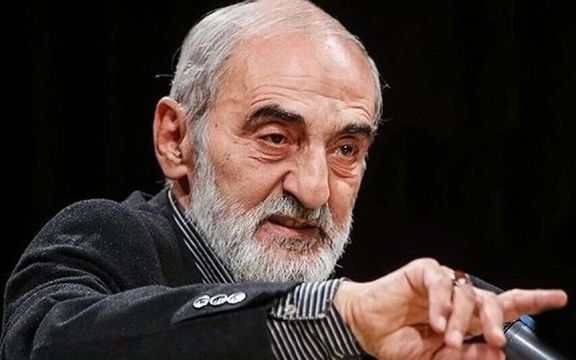
On Monday, ultraconservative daily Kayhan's editor Hossein Shariatmadari wrote in a commentary that those, including many former diplomats who have criticized Tehran's pro-Russia and pro-China foreign policy, are demanding too much from the government.
Kayhan defended the government's relative inaction in response to Russia's behavior and added that Iran could not possibly declare war against Russia or sever its ties with Moscow. Shariatmadari's article, particularly his attacks on the country's reformists who criticized Russia, was perceived as siding with Moscow by Iranian media both in and out of Iran.
Shariatmadari accused Russia's critics of selling out their country to the United States and said that the former diplomats who have criticized Russia are suffering from a feeling of inferiority in front of the United States. Meanwhile, he accused former Foreign Minister Javad Zarif of having been prepared to start negotiations with the UAE over the islands' ownership.
Another ultraconservative newspaper, Hamshahri, which is affiliated with the Tehran Municipality, expressed support for Russia's position and even endorsed Moscow's war against Ukraine during the past week. The daily argued that Ukraine should not have defended itself against Russia's onslaught.
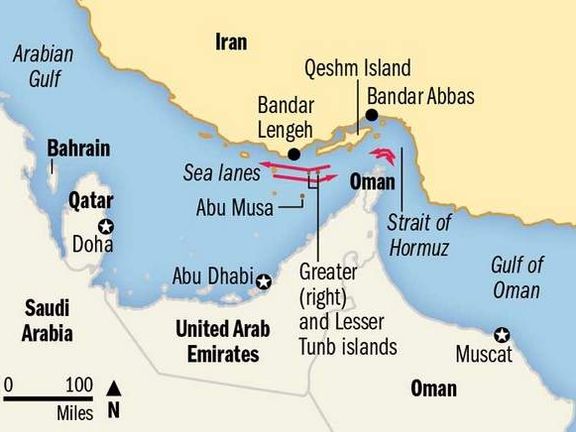
Sara Massoumi, another Iranian journalist, criticized Iran newspaper's approach, stating, "It is shameful that a newspaper that still remembers the Iran-Iraq war and its chemically wounded veterans is so fascinated by Russia that it portrays the aggressor in the Ukraine war as the victim."
Meanwhile, in an article in Etemad Online website, reformist politician Esmail Gerami Moghaddam wrote that Iranian conservatives' Looking East policy is against the country's national interests. He also called for an appropriate and proportional reaction on the part of the Iranian government to Russia's behavior.
Calling on the Iranian government to adopt logical positions and carry out a balanced foreign policy, Moghaddam asked, "What makes you believe that Russia is superior to the United States so that you defend it so wholeheartedly?"
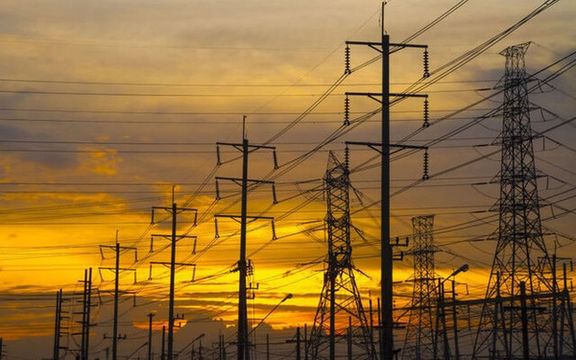
Washington has made a change in the way Iraq pays Iran for electricity, seemingly to reduce Iranian pressure on Iraq, but it could potentially also weaken US sanctions.
According to an exclusive report by Reuters, the Biden administration on Tuesday moved to let Iraq pay Iran for electricity via non-Iraqi banks, a US official said, a step Washington hopes may keep Tehran from forcing unpopular power cuts during the sweltering Iraqi summer.
Secretary of State Antony Blinken signed a 120-day national security waiver allowing Iraq - heavily dependent on Iranian electricity - to deposit such payments into non-Iraqi banks in third countries instead of into restricted accounts in Iraq, said the official who spoke on condition of anonymity.
Reuters, apparently quoting the official, said that funds put into the non-Iraqi banks, like those deposited into Iraqi banks, will also be restricted, still requiring US permission for Iran to get access to them and only for spending on humanitarian goods.
Tehran has in the past pushed Baghdad to secure US permission to release such funds by cutting Iranian natural gas exports to Iraq, limiting Iraq's ability to generate power, and forcing deeply unpopular electricity cuts.
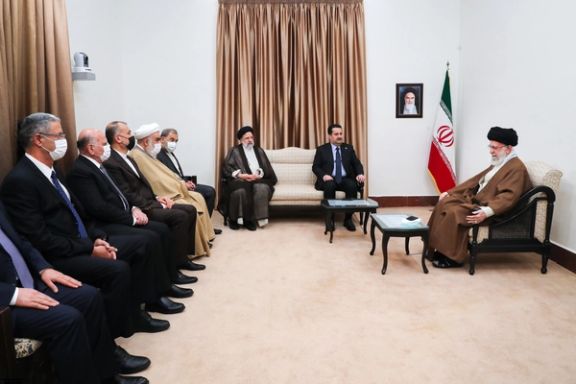
Reuters said the change came at the request of the Iraqi government, apparently in the hopes that this might transfer some of the pressure that Iran has exerted on Baghdad to other countries.
But it is not clear if the change is not the result of an Iranian plan to gradually weaken the impact of US banking sanctions on its dealings with Iraq. Iran’s next move could be pressure on Iraq to ask the United States to lift all restrictions on the funds, enabling Tehran to withdraw cash dollars. The current Iraqi government has closer ties with Tehran than its predecessor.
"We have to help the Iraqis with this perennial pressure from the Iranians to access the money," the US official told Reuters.
"The Iraqis have requested, and now we have agreed, to expand the waiver," said the US official, adding that this might help ensure better compliance with the US requirement that any disbursements be for humanitarian purposes.
"It also helps the Iraqis, at least somewhat, to have an argument to make (to Iran) that they are not in control of the money that they have paid (into non-Iraqi accounts)," he added.
If this was a change resulting purely from an Iraqi-US agreement, it is not clear whether Iran might ease up on Iraq as a result. Tehran could decide it has greater leverage over Iraq than over other nations and continue to exert pressure.
Last week it was reported that Iraq was willing to barter oil with Iran instead of cash payments, which could also violate US sanctions.
Iraq exports at least four times more oil than Iran, with more than $100 billion annual revenues, but with its inefficient government and corruption it has not been able to tap its own natural gas to produce electricity.
Iran is under extensive US economic sanctions reimposed in 2018 after then-US President Donald Trump abandoned the nuclear deal that Tehran struck with major powers Britain, China, France, Germany, Russia and the United States in 2015.
Trump believed his policy of "maximum pressure" on Iran would force it to accept more stringent restrictions to its nuclear program, which the United States, European powers and Israel fear may be designed to obtain a nuclear weapon.
As a result of Trump's withdrawal from the deal and US President Joe Biden's failure to revive it, Iran could make the fissile material for one bomb in 12 days or so, according to U.S. estimates, down from a year when the accord was in force.
With exclusive reporting by Reuters

An Iranian lawmaker who revealed bribery involving a former minister and at least 75 members of parliament has been sentenced to one year behind bars.
Ahmad Alirezabeigi, representing Tabriz in the parliament, told Shargh daily Tuesday that his second court session was held Monday on charges of "spreading lies,” a legal term in the Islamic Republic similar to libel.
He added that he has evidence on the bribery case and had argued that his trial should be held publicly with the presence of a jury because the current court – which handles cases related to state officials -- does not have the jurisdiction to handle this case.
However, he stated that apparently his explanation was not accepted, and the court issued the verdict. If the one-year prison sentence is upheld by the court of appeals, he must immediately go to prison.
Alirezabeigi revealed in late April that over 70 SUVs were offered to lawmakers at a lower price by the industry ministry ahead of their debate on a motion last December to impeach former industry minister Reza Fatemi-Amin. Forty lawmakers had demanded his impeachment for “inadequate performance” including failure to control rising prices for domestically produced vehicles, their low quality, preventing competitive imports, and corruption in the industry.

In mid-June, he revealed more information about the bribery case, saying contracts had been finalized for the transfer of "300 vehicles," of which 147 were accounted for but the whereabouts of 153 vehicles were still unknown, calling on the public prosecutor to investigate and determine what has happened.
“Most of the 147 delivered vehicles have been handed over to unknown individuals who are apparently connected to members of the parliament," he added.
More than 200 members of parliament sent text messages to the public or told the media that they were never involved in the scheme and did not benefit from it. The media published a list of others who have not denied receiving the SUVs. These include both supporters of Speaker Mohammad Bagher Ghalibaf and hardliner Paydari Front lawmakers.
The whistleblower MP, who was also banned from speaking during parliamentary sessions in June, was indicted for “making a claim without evidence” in May, a ruling that he rejected saying the parliament and its presiding board have violated the law.
The regime’s conduct is growing more and more opaque since hardliners won a big majority in managed elections in 2020 and President Ebrahim Raisi was elected in 2021 in a similarly engineered vote.
Prosecutions such as that of Alirezabeigi are taking place while former officials connected to powerful insiders who have been jailed for their involvement in colossal embezzlement or even criminal cases are being freed without serving their time.
On Tuesday, judiciary spokesman Masoud Setayeshi announced that Hossein Fereydoun -- the brother of former president Hassan Rouhani – and Hadi Razavi – the son-in-law of former labor minister Mohammad Shariatmadari – were released from prison.
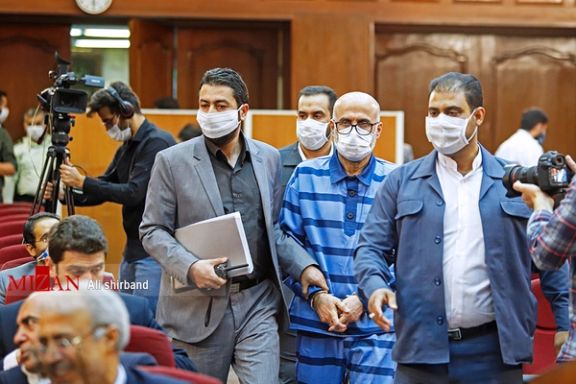
Razavi, sentenced to 20 years for paying bribes to managers of Iran’s Sarmayeh Bank, had started his sentence in 2019. Fereydoun was sentenced to five years in 2019 but rarely served his sentence as he was on long furloughs due to “medical concerns.”
Referring to Fereydoun, Setayeshi said, "We cannot keep someone if he has a medical problem." He made the comment despite the fact that a lot of Iranians have died or are suffering in prison due to the authorities’ deliberate denial of medical care.
Late in June, the judiciary announced its former deputy Akbar Tabari was released from prison after serving just 45 months of a 31-year prison term after posting a bail of 3 trillion rials ($6 million). Before being arrested in July 2019, Akbar Tabari held senior financial and executive positions within the Iranian judiciary for nearly 20 years.
Earlier in June, state media also announced the release of Mehdi Hashemi, the son of former president Ali Akbar Hashemi Rafsanjani, and Mohammad-Ali Najafi, a former Tehran mayor and minister of education who had confessed to the murder of his wife Mitra Ostad in 2019.

The Tehran Electronic Commerce Association has published a detailed report describing the internet quality situation in Iran as "critical."
This 68-page report examines the issues of speed, limitations, and disruptions and reveals that Iran's internet is among the most disrupted and limited in the world, with internet speeds ranking among the five slowest globally. The report places Iran's internet quality as the second most disrupted after Myanmar and the second most limited after China.
The report also highlights data from Cloudflare, ranking Iran 97 out of 100 countries in terms of average internet speed, with only Sudan, Cameroon, and Cuba having slower speeds.
Despite the documented evidence highlighting the unfavorable situation of internet access in Iran, the authorities, including the Minister of Communications, have consistently described the network's quality as adequate and high-speed, downplaying the dismal situation.
It is widely known that regime authorities and the country's elite do not suffer the same poor quality as the masses, not least, those in rural areas. This has been compounded by mass crackdowns on sites and social media platforms as the regime aims to quash dissent.
The report explains that Iran's internet filtering involves three lists: white, gray, and black. Authorized websites are placed on the white list, unauthorized websites on the blacklist, and a significant portion of the domains and IPs, referred to as the gray list, face "intentional" disruptions.
The study reveals that the equipment used by filtering institutions in Iran intentionally disrupts around 50% of the data sent to addresses on the gray list. In other words, any internet traffic not recognized by authorized institutions and not on the whitelist automatically faces disruption.
The association holds various entities, including the Ministry of Communications, the Prosecutor's Office, judicial institutions, the Commission for Determining Criminal Instances, the Supreme National Security Council, and "some security institutions," responsible for the dire state of the internet in Iran.
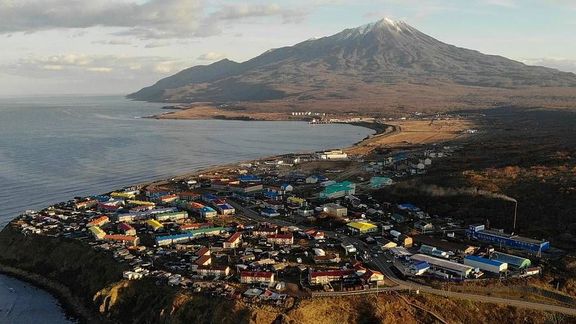
Feeling betrayed by Moscow’s support for UAE’s claim on three Iranian islands, a top official in Tehran has backed Japan’s demand for talks over the Kuril Islands.
During a meeting with Japan’s ambassador to Iran Aikawa Kazutoshi, Kamal Kharrazi, the head of Iran’s Strategic Council on Foreign Relations and a foreign policy advisor to Supreme Leader Ali Khamenei, said that the best way to resolve the territorial dispute between Japan and Russia over the four islands is through “direct negotiations.”
At the end of World War II, Russia annexed the Kuril Islands in the Pacific Ocean to its territory, but Japan calls these islands the Northern Territory and considers them “occupied by Russia.”
Talking about the Russian invasion of Ukraine and the possible consequences of the crisis for Japan and its surrounding environment, the Japanese envoy said that since the war has started, Russia has halted bilateral negotiations with Japan regarding the occupation of the Kuril Islands.
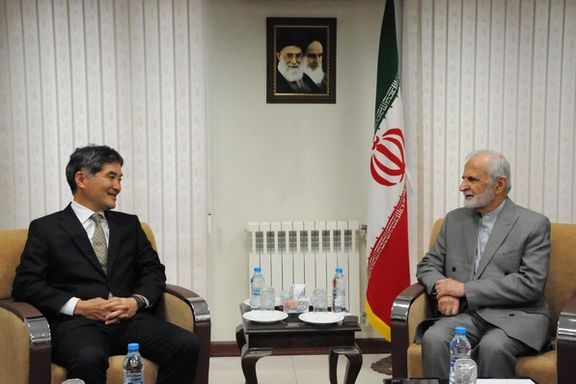
Kharrazi stated that as a matter of principle, Tehran is against any military intervention and violation of the sovereignty and territorial integrity of countries, and the best solution is bilateral talks to resolve the Kuril islands dispute.
This was exactly the position Russia took last week regarding three Iranian islands in the Persian Gulf contested by the United Arab Emirates.
In a joint Russia-GCC statement at a meeting, held in Moscow on July 10, Russia voiced support for the UAE's demand to hold talks about sovereignty over Greater Tunb, Lesser Tunb, and Abu Musa Iranian islands.
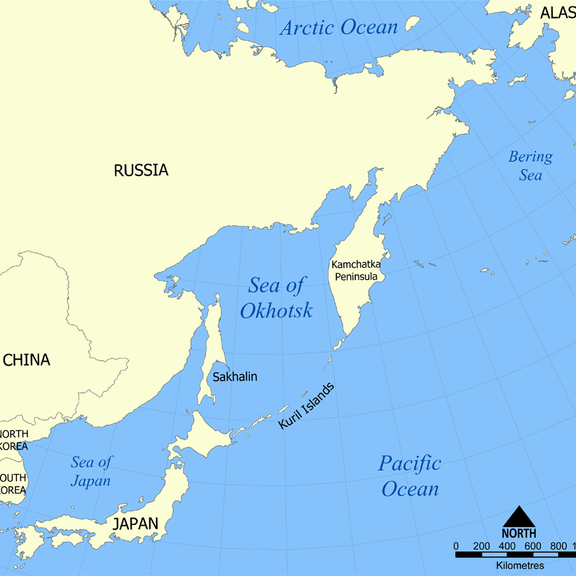
The statement called for "bilateral negotiations or the International Court of Justice, in accordance with the rules of international law and the United Nations Charter, to resolve this issue in accordance with international legitimacy".
Iranian media, opposition activists and ordinary Iranians were outraged over Moscow’s move and viewed the regime’s reactions not strong enough.
Qasem Mohebbali, a former senior diplomat who headed the Middle East division of the foreign ministry, criticized the regime’s pro-Russia and anti-West foreign policy as the reason why Iran’s allies are teaming up with its regional rivals, noting that Russia and China believe that no matter what they say or do, Tehran will continue to support them over Ukraine, Tibet and Taiwan.
Mohebbali said that China and Russia care more about their relations with Arab countries than with Iran. “Apparently, Iran's friends do not pay much attention to Iran's demands and pay more attention to the rivals’ [Arab] demands,” he said.
In its Thursday edition, conservative newspaper Jomhouri Eslami wrote in a strongly worded editorial: "This is not going to be Russia's last treason against Iran." The daily added: "Foreign Ministry officials should not think that this episode will end by summoning Russia's ambassador. We need an essential revision of our political relations with Russia and forcing Russian statesmen to regret their treason against the Iranian nation."
Asked why Moscow undermined Iran's territorial integrity," international relations analyst Mehdi Motaharnia told Khabar Online that "Russia wishes to put an end to its isolation by sacrificing Iran's interests." Meanwhile, he called Iranian officials' mild reaction "a withdrawal from revolutionary positions."
The Foreign Ministry summoned Russia's ambassador and Foreign Minister Hossein Amir-Abdolahian and government spokesman Ali Bahadori wrote in separate tweets that "Iran will not compromise over its national interests and territorial integrity." However, Tehran’s official reaction to Russia has been meek. Social media users said officials had indeed made a compromise by not naming Russia in their tweets.
Vowing “a strong response” to such moves, foreign ministry spokesman Naser Kanaani said that Iran “views the interference of any party, including the UAE and Russia, as unacceptable and rejects it.
The United Arab Emirates has repeatedly laid claim to the islands, describing the situation as “the continued occupation by the Islamic Republic of Iran.”
The three islands fell under British control in 1921 but on November 30, 1971, a day after British forces left the region and just two days before the UAE was to become an official federation, Mohammad Reza Shah sent the Iranian navy to secure all three. Iranian forces remain on the islands, with only Abu Musa having a civilian population which is less than two thousand.